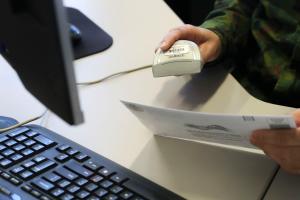Spotlight PA is an independent, nonpartisan newsroom powered by The Philadelphia Inquirer in partnership with PennLive/The Patriot-News, TribLIVE/Pittsburgh Tribune-Review, and WITF Public Media. Sign up for our free newsletters.
HARRISBURG — Pennsylvania’s Supreme Court has ordered counties to “refrain from counting” undated or misdated mail ballots in next week’s election, a high-profile decision that could invalidate at least thousands of otherwise acceptable ballots.
More litigation is possible, however.
The justices, down a member after the September death of Chief Justice Max Baer, deadlocked three-to-three on whether counting undated or misdated mail ballots violates federal civil rights law. And while they ordered county election officials not to count undated or misdated ballots, they also told them to segregate and retain those ballots.
That likely means the justices are leaving open the possibility that federal courts could rule differently and, after the election, order the segregated ballots to be counted.
The justices haven’t yet released the full reasoning behind their decisions in the case.
In their Tuesday order, they wrote that Democratic justices Debra Todd, Christine Donohue, and David Wecht think throwing out ballots based on the date requirement violates federal law, while Democrat Kevin Dougherty and Republicans Sallie Updyke Mundy and Kevin Brobson think it does not.
The ballots in question, which arrive on time at county election offices and are otherwise valid, are missing dates on their outer envelopes or include incorrect dates. The question of whether they should be counted has led to years of litigation and yielded no firm legal consensus.
Before the court’s ruling, that unsettled legal status had created a confusing situation for county officials deciding whether to count undated ballots.
Their clearest direction had come from Pennsylvania’s Department of State, which had issued nonbinding guidance based on two Commonwealth Court rulings telling counties they should tabulate undated and misdated ballots. Most counties had planned to follow that guidance for this election.
Counties had also generally accepted misdated ballots in the past.
This latest lawsuit, filed just over two weeks ago, stems from the Republican National Committee, National Republican Congressional Committee, Pennsylvania GOP, and some individual Republican voters filing what’s known as a King’s Bench Petition to the Pennsylvania Supreme Court.
This kind of petition asks the state’s high court to use its unique power to bypass the lower courts and directly take up matters of particular importance. The court granted the Republicans’ request Oct. 21.
Since 2020, Pennsylvania Republicans have generally sought to have undated ballots thrown out. The issue is highly partisan; Democrats are more likely than Republicans to vote by mail.
Attorneys for the Republicans in the case argued that the General Assembly’s meaning “could not have been clearer” when it passed a state law saying voters “shall…fill out, date and sign the declaration” printed on their ballot’s outer envelope, and that there’s no good reason for the court to rule differently.
They also wrote that the dates are materially useful in determining whether ballots should be accepted, and invoked a controversial argument, known as the “independent state legislature” doctrine. It posits that state legislatures are the ultimate authority on election matters and that Pennsylvania’s executive and judicial branches don’t have any power to check a legislature’s decisions.
Pennsylvania’s Democratic administration has argued since 2020 that undated and misdated mail ballots should be counted. The central premise of their position has long been that Pennsylvania’s election law should be interpreted to enfranchise more people — and that decades of court rulings have done so.
“Where there is a choice, the Court should prefer that construction of the law that ‘favors the fundamental right to vote and enfranchises, rather than disenfranchises, the electorate,’” the administration’s attorneys wrote in their latest brief to the state Supreme Court, quoting a 2020 Pennsylvania Supreme Court decision on elections.
Attorneys for the state also wrote that although state law says voters “shall” date their mail ballots, that doesn’t necessarily mean undated ballots must be discarded. A separate part of the state Election Code, they argued, states that county election officials should not discard ballots if the voter declaration on the ballot’s outer envelope is “sufficient.” They argued that a historical reading of the code shows that the dating requirement is actually a relic.
With the case effectively settled on the state level, federal courts could now determine the way Pennsylvania handles undated and misdated mail ballots.
There have already been some indications of federal judges’ thinking on these ballots.
In May, the U.S. Court of Appeals for the Third Circuit ruled that undated ballots should be counted because Pennsylvania’s date requirement was a technicality that served little purpose except to invalidate votes, and that throwing out ballots on that basis violated the Civil Rights Act of 1964.
But last month the U.S. Supreme Court vacated that decision on procedural grounds. Though their decision didn’t address the substance of the case, three of that court’s conservative justices have separately indicated that they disagree with the Third Circuit’s take that the date requirements violate federal law.
>>READ MORE: Why are undated mail ballots such a big deal in Pennsylvania?
WHILE YOU’RE HERE… If you learned something from this story, pay it forward and become a member of Spotlight PA so someone else can in the future at spotlightpa.org/donate. Spotlight PA is funded by foundations and readers like you who are committed to accountability journalism that gets results.
